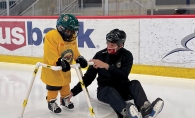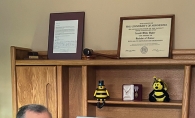Try to imagine a world without fire rescue or emergency medical personnel: Picking up the phone and dialing 911, only to find nobody on the other end of the line—or not even having an emergency line to call. This is the scenario people in Liberia face after years of civil war and unrest have left the country devastated.
A military coup overthrew the Liberian government in 1980 and launched a decades-long civil war that resulted in around 250,000 casualties and thousands of people fleeing the country. A ceasefire agreement was reached in 1995 but violence erupted again in 1999. Peace was finally restored in 2003. However, the country’s infrastructure was left completely decimated.
The Fire Rescue Alliance (FRA) formed in 2010 to help rebuild Liberia’s fire and medical programs. Led by Chief Ken Prillaman from Brooklyn Park, the FRA formed teams of firefighters from across the United States to travel to Liberia.
Edina Fire Chief Tom Schmitz and Fire Marshal Jeff Siems were two members of an FRA group deployed to Liberia last November. Each was approached by Prillaman because of their specific skills—Siems’ disaster relief and medical experience, and Schmitz’s training and leadership experience. It’s hard to say no to an offer from a respected peer. It’s even harder to pass up an opportunity to help people in such desperate need. So both men jumped at the opportunity and spent 10 days lending their expertise in a dire situation.
Monrovia, the capital of Liberia, is home to about 1.2 million people. And they had one working fire truck serving the entire population. “That’s about the equivalent of Minneapolis, St. Paul and the surrounding suburbs having only one working fire truck,” Siems says.
With conditions so dismal, the FRA began by sending a preliminary scout team to assess the most glaring needs. This group was followed by two waves of volunteers. Both Siems and Schmitz were part of the second team. Schmitz served as the task force leader, wrote the training guide for the FRA volunteers and oversaw their work with the people of Liberia. Siems worked primarily to rebuild pre-hospital medical programs, conduct capability assessments and train the executive protective services, the Liberian equivalent of the Secret Service.
The challenge for Schmitz and Siems was making a real impact while working in a foreign country with few resources. “The logistics were really challenging,” Schmitz says, “such as having enough equipment and trainers in the right locations.”
One of the skills Schmitz and his group brought with them was working with a fire hose. The Liberian firefighters were using technology that was 30 years old, and because water is so scarce, the FRA volunteers created a system where the trainees would fire the hose into a 750-gallon tank, and continue recycling the water in order to get the necessary training without creating waste.
It was that kind of training that made all the difference. When they arrived, the pair found Liberians fighting fires in flip-flops and T-shirts and working with an ambulance that would barely run. When they left, the people had protective fire gear donated from stations across the United States, new medical supplies and a refurbished fire truck and ambulance. More importantly, the FRA laid the foundation for training in the skills to save lives, and the people of Liberia couldn’t have been more grateful and receptive.
“They actually had firefighters walking three or four days just to attend class,” Siems says. “We were expecting to see 10 to 15 folks but there were 75 to 100 firefighters coming from throughout the nation. It was just so exciting to see how enthusiastic they were. For a country devastated by civil war, the people and their spirit were phenomenal.”
Both Siems and Schmitz know that as great as their impact may have been, there is still a huge amount of work to be done in Liberia. Both also know the people of Liberia will continue to work hard to rebuild and hope that one day the country will return to where it was before the civil war.
&
For more information about Fire Rescue Alliance and to volunteer or donate, visit firerescuealliance.org









